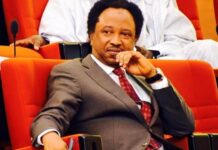The 16th Emir of Kano, Muhammadu Sanusi II, has raised significant concerns regarding the severe economic hardships faced by Nigerians. His remarks were made during a ceremony held on Thursday for the distribution of free fertilizer to 52,800 smallholder farmers across Kano State’s 44 local government areas. This event, which took place at the Government House, saw the attendance of the newly appointed second-class Emirs of Gaya and Karaye, underscoring the importance of the initiative.
Emir Sanusi highlighted the dire situation many Nigerians are currently experiencing, particularly in relation to the skyrocketing cost of living. “People are in a dire situation. I’m aware that people now resort to buying half pepper because of the high cost of food items. This is unbearable. But I think with efforts like this, people can get some relief,” he stated, drawing attention to the everyday struggles faced by ordinary citizens.
The fertilizer distribution initiative aims to alleviate some of these economic pressures and promote food security within the state. Each farmer, including women and persons living with disabilities, will receive a 25kg bag of fertilizer. This gesture is designed to support smallholder farmers in increasing their agricultural productivity, thereby enhancing their livelihoods and contributing to the state’s overall food supply.
Emir Sanusi commended the Kano State Government for this initiative but also urged for continued and expanded efforts to address the ongoing economic challenges. He stressed that while the fertilizer distribution is a positive step, more comprehensive measures are needed to provide lasting relief to the population.
Kano State Governor, Abba Yusuf, reiterated the government’s commitment to supporting farmers and ensuring that food remains accessible and affordable for all. “We are determined to support our farmers and ensure that food is available and affordable for all,” he affirmed, highlighting the administration’s focus on agricultural support as a key strategy for economic relief.
The Emirs of Gaya and Karaye also expressed their endorsement of the program. Emir of Gaya, Ali Ibrahim, noted, “This distribution of fertilizer will significantly contribute to food security in our state.” Similarly, Emir of Karaye, Mahammad Mahraz, voiced optimism about the initiative’s potential benefits for the farming community, underscoring the crucial role of agricultural support in the region’s economic stability.
Representatives from the All Farmers Association of Nigeria (AFAN) were present at the ceremony, expressing their gratitude for the government’s gesture. AFAN official Ibrahim Inuwa remarked, “This initiative will help bring down the cost of food items in the state and provide much-needed support to our farmers.” The association’s endorsement highlights the program’s alignment with the needs and expectations of the farming community.
 The fertilizer distribution initiative is seen as a critical intervention at a time when many Nigerians are grappling with economic hardships exacerbated by rising food prices. By providing direct support to farmers, the Kano State Government aims to boost agricultural productivity, ensure food security, and alleviate some of the economic burdens faced by its citizens.
The fertilizer distribution initiative is seen as a critical intervention at a time when many Nigerians are grappling with economic hardships exacerbated by rising food prices. By providing direct support to farmers, the Kano State Government aims to boost agricultural productivity, ensure food security, and alleviate some of the economic burdens faced by its citizens.
Emir Sanusi’s remarks and the collective support from the traditional and farming communities underscore the importance of collaborative efforts in addressing economic challenges. The initiative serves as a reminder of the crucial role that agriculture plays in the economy and the need for continuous support and innovation in this sector to ensure the well-being of the population.
As the program unfolds, it is hoped that such interventions will pave the way for more comprehensive strategies to tackle the economic difficulties faced by Nigerians, ultimately leading to improved living conditions and sustainable development. The leadership and proactive measures demonstrated by the Kano State Government and its traditional institutions are pivotal in navigating these challenging times and fostering resilience among the populace.




